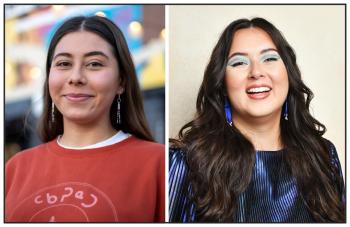Image Caption
Summary
Local Journalism Initiative Reporter
Windspeaker.com
On June 10, an Indigenous owned space called aaniin Retail Inc. will open its doors in the Stackt Market located in downtown Toronto at 28 Bathurst, at the corner of Bathurst and Front streets. It will showcase 30 Indigenous designers of street wear, evening wear, accessories and more. aaniin is also online.
“I’m trying to create a foundational brand that is accessible for Indigenous artists, designers and businesses to sell their products at, while making sure that 100 per cent of the profits always end up back into Indigenous hands directly,” said aaniin founder and street-wear designer Chelsee-Marie Pettit. She is from Aamjiwnaang First Nations.
The concept for her business came following an experience she had while walking in the city’s downtown core.
From a distance she saw someone wearing what appeared to be a shirt with syllabics printed on it. Syllabics are a system of writing used by many Indigenous peoples to communicate.
“I felt this type of inclusivity in the city that I had never felt before, and, basically, as I got close, I realized the syllabics were actually just a triangle on the shirt and all of a sudden I just felt super bummed that it wasn’t what I expected it was,” Pettit said.
Following this experience, Pettit jumped into action and began conceptualizing a clothing line for her company.
“(I) wanted to create an Indigenous street-wear brand that uses the syllabics as the main design focus on all of the apparel and all of the marketing,” she said.
As her fashion design began to evolve, an idea came to her to create a space where like-minded Indigenous individuals would sell their products at the same location.
She decided to test the concept and reached out to other Indigenous designers. She spearheaded a pop-up shop at the Stackt Market and brought her own pieces to sell, along with items from 10 other creators.
“In just three weeks the entire place sold out,” she said.
Her strategy of working in collaboration with similar businesses is not typical for the industry, but, to Pettit it just made sense and proved successful.
“I believe it makes us stronger when we are working together,” she said.
Following the sell-out, Pettit decided to continue the store and signed a lease for the remainder of 2022.
“I decided that it was a good time and opportunity just to keep it going. At this point I quit my job. I really wanted to just see what happened if I focused all my effort onto it,” she explained, adding she left a career in digital marketing.
Last year proved that her concept was sound, and that led Pettit to continue with the initiative in 2023 with about 30 contributors. The aaniin space is set to open in June.
Some of the contributors include Neechi by Nature, Lesley Hampton, Pre&Peri, Ocean Kiana, Born in the North, Karahkwa Jewelry, Riks Works, and FutureKokum.
The designers and artists offer unique products, some of which visually depict that they are created by an Indigenous artist, while others fit more into mainstream clothing designs.
“I really want to abolish the misconception that things have to look distinctly Indigenous,” said Pettit.
“Indigenous art is just made by Indigenous people or artist. So, it’s really just taking everybody’s unique perspective. Some people focus on really traditional art. Other people focus on different mediums. Maybe they don’t look Indigenous in terms of the art form or the medium, but it’s still made by an Indigenous person so that’s basically what I’m trying to drive.”
Lesley Hampton, an Anishinaabe artist and fashion designer from Temagami First Nation, is showcased in the space and said she eagerly agreed to take part when Pettit approached her to be a contributor.
“Learning more about the structure and the initiatives that she is putting together to really amplify Indigenous voices, it’s really exciting to be a part of,” said Hampton. Pettit described Hampton as a Canadian pillar in the fashion community and a role model for Indigenous women.
Since 2016, Hampton’s self-titled brand has focused on high quality eveningwear, athletic-wear and leisure-wear that are size-inclusive.
Her clothing has been featured in a number of runway shows, received numerous awards and nominations, as well has been featured in multiple films. She was the 2020 Fashion Impact Award nominee at the Canadian Arts and Fashion Awards.
“(I’m) trying to make a statement in fashion and really show all the facets of what Indigenous fashion can be and, in doing so, really bridge the worlds between the mainstream fashion space and Indigenous fashion,” said Hampton.
“I see fashion and art as a form of storytelling, so it’s definitely the stories that I tell through fashion and through runway that are Indigenous stories that I want to put out into the world or to educate the greater public on what’s happening in Indigenous communities. So that’s where I would say it intersects.”
For Pettit, Hampton’s strong sense of community is exactly why she wanted her to be a part of the aaniin Retail Inc. space.
Pettit wants to continue building the aaniin brand and hopes it to one day be an all-Indigenous department store where consumers can shop in support of Indigenous entrepreneurs.
“When you are getting these designs and products and brands from an Indigenous source directly, that’s appreciation. And I think that is kind of my biggest strategy, is making sure that everybody who is coming into the store, becoming a customer, they are becoming educated, but they are also feeling proud to wear and support the pieces that they purchase inside aaniin.”
Products from the space can be purchased in person or online at https://www.aaniin.shop/
Never miss a Windspeaker article. Subscribe Today to our new Windspeaker Newsletter!
Local Journalism Initiative Reporters are supported by a financial contribution made by the Government of Canada.

